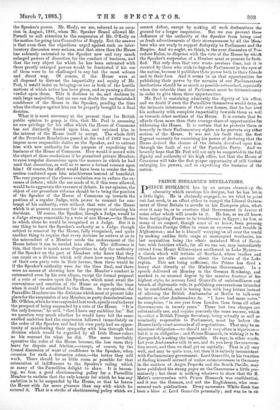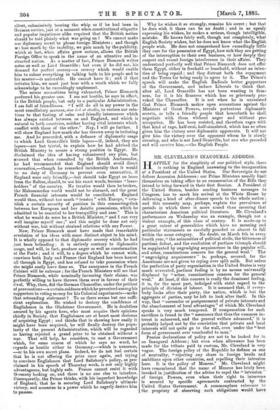PRINCE BISMARCK'S REVELATIONS.
PRINCE BISMARCK has by no means cleared-up the obscurity which envelops his designs, but he has let-in a little light. He is obviously engaged, as we tried to point out last week, in an effort either to compel the Liberal Govern ment of Great Britain to accede to his European plan, whatever it may be, or to overturn that Government in favour of some other which will accede to it. He has, as we all know, been instigating France to be troublesome in Egypt ; he has, as many of us suspect, though none of us know, been pressidg the Russian Foreign Office to cause us expense and trouble in Afghanistan ; and he is himself worrying ne all over the world by making sudden little snaps at unoccupied territories, his last acquisition being the whole mainland West of Zanzi bar, with frontiers which, for all we can see, may immediately extend from Mount Kilima-njaro southward to Lake Nyassa a clutch which will irritate all Scotland, where traders and Churches are alike anxious about the future of the Lake region. This not being sufficient, the Prince has fired a heavy shot directly at the Gladstone Government. In a speech delivered on Monday in the German Reichstag, and marked to an unusual degree by the massive hauteur of his highest style, he accuses Lord Granville of unfriendliness and breach of diplomatic rule, in publishing conversations intended to be confidential, and in boring him with long letters instead of allowing the British Ambassador at Berlin to talk-over matters as other Ambassadors do. " I have had more notes," he complains, " in one year from London than from all other Governments in twenty years." These last two charges are substantially one, and require precisely the same answer, which is,—that a British Foreign Secretary, being actually as welt air nominally responsible to Parliament, must lay before the Houses fairly exact accounts of all negotiations. That may be an injurious obligation—we should say it very often is injurious— but it is an obligation ; and Prince Bismarck, in wishing it to be disregarded, is asking the impossible. He says, in other words, Let your Ambassador talk to me, and do you keep the conversation secret, and then we shall get on capitally. That is all very well, and may be quite true, but then it is entirely inconsistent with Parliamentary government. Lord Granville, in his vexation at finding himself accused of undue submissiveness to Germany in the matters of Angra Pequeba and the South Pacific, may have published his strong paper on the Cameroons a little prematurely ; but there is nothing whatever to show that Sir B. Malet's conversation with Prince Bismarck was confidential, and it was the German, and not the Englishman, who commenced such publications. Every successive White-Book has been a blow at Lord Granville personally.; and was he to sit
silent, submissively bearing the whip as if he bad been in German service, just at a moment when constitutional etiquette and popular impatience alike required that the British nation should be told plainly what was going on I We cannot make our diplomacy secret to please foreign Ministers ; and though w.r lose much by the inability, we gain much by the publicity, which at last, when affairs grow serious, allows the British Foreign Office to speak in the name of an attentive and instructed nation. As a matter of fact, Prince Bismarck writes notes as well as Lord Granville ; but even if he did not, his demand for perfect secrecy—a secrecy which would enable him to colour everything in talking both to his people and to his master—is untenable. He cannot have it ; and if that irritates him, we must just bear with a wrath which we fully acknowledge to be exceedingly unpleasant.
The minor accusations being exhausted, Prince Bismarck preferred his greater one: I am not hostile, he says in effect, to the British people, but only to a particular Administration. I am full of friendliness. "I will do all in my power in the most conciliatory manner, sine iris et studio, to restore our relations to that footing of calm and friendly intercourse which has always existed between us and England, and which is natural to both countries, neither having vital interests which conflict with those of the other." Nay, I will go further. I will show England how much she has thrown away in irritating me. And he proceeded, with a defiance of diplomatic usage to which Lord Granville's little lapses—if, indeed, they are lapses—are but trivial, to explain how he had advised the British Ministry to secure a strong position in Egypt. He disclaimed the idea of having volunteered any plan, but avowed that when consulted by the British Ambassador, he had recommended that England should avoid direct annexation,—though he remarked incidentally that it would be no duty of Germany to prevent even annexation, if England were only friendly,—but should take Egypt on lease from the Sultan, should, to use his exact words, become " leaseholders " of the country. No treaties would then be broken, the Mahommedan world would not be alarmed, and the great French financial interests would be conciliated. England would thus, without too much " tension" with Europe, " establish a certain security of position in this connecting-link between her European and her Asiatic possessions, which he admitted to be essential to her tranquillity and ease." This is what he would do were he a British Minister," and I can very well imagine myself one ;" and this might be done not only without war, but without strained relations with any Power.
Now, Prince Bismarck must have made that remarkable _revelation of his ideas with some distinct object in his mind. It is wholly opposed to that diplomatic secrecy which he had just been belauding ; it is entirely contrary to diplomatic usage, and will, in fact, produce anger as well as consternation at the Porte ; and it will, to a degree which he cannot wish, convince both Italy and France that England has been honest all through in Egypt, and has refused to take possession when she might easily have done so. The annoyance in the French Cabinet will be extreme ; for the French Ministers will see that Prince Bismarck, while nominally favouring their claims, was perfectly willing to have thrown them over in favour of their rival. Why, then, did the German Chancellor, under the pettiest of provocations—a certain coldness which he perceived among his supporters in voting money for his Colonial experiments—make that astounding statement ? To us there seems but one suffi cient explanation. He wished to destroy the confidence of Englishmen in the Gladstone Government. He is doubtless assured by his agents here, who must acquire their opinions chiefly in Society, that Englishmen are at heart most desirous of acquiring Egypt ; and thinks that in showing how easily it might have been acquired, he will finally destroy the popu larity of the present Administration, which will be regarded as having rejected a grand prize to be obtained without a war. That will help, he considers, to oust a Government which, for some reason of which he says no word, he regards as hostile either to Germany,—which is nonsense, —or to his own secret plans. Indeed, we do not feel certain that he is not offering the prize once again, and trying to convince Englishmen that Lord Salisbury's policy, as proclaimed in his speech of Thursday week, is not only highly advantageous, but highly safe. France cannot resist it with Germany looking on, and there is no one else to interfere. Consequently, the Prince thinks, with his imperfect knowledge of England, that he is securing Lord Salisbury's ultimate victory, and accession to a power which he eagerly desires him to possess. Why he wishes it so strongly, remains his secret ; but that he does wish it there can be no doubt ; and in so openly expressing his wishes, he makes a serious, though intelligible, mistake. He knows fairly well, though not completely, what English Society wishes, but he does not know what the English people wish. He does not comprehend how exceedingly little they care for the possession of Egypt, how sick they are getting of the interruption to their own business, or how deeply they suspect and resent foreign interference in their affairs. They understand perfectly well that Prince Bismarck does not offer them Egypt, either in freehold or leasehold, without an intention of being repaid ; and they distrust both the repayment and the Tories for being ready to agree to it. The Prince's speech will make the English Radicals better supporters of the Government, and induce Liberals to think that, after all, Lord Granville has not been wanting in firmness, for it is his firmness which has so grievously pro voked the Chancellor. It is not when he is unresisted that Prince Bismarck makes open accusations against the Ministers of Great Powers, reveals portentous diplomatic secrets, or tells a friendly people that henceforth he shall negotiate with them without anger and without preoccupation. He has been resisted, and therefore rages with that kind of rage, half-real, half-simulated, which has so often given him the victory over diplomatic opponents. It will not give him the victory over the opponent whom he is slowly arousing, and who is not Lord Granville, but one who preceded and will survive him,—the English People.















































 Previous page
Previous page